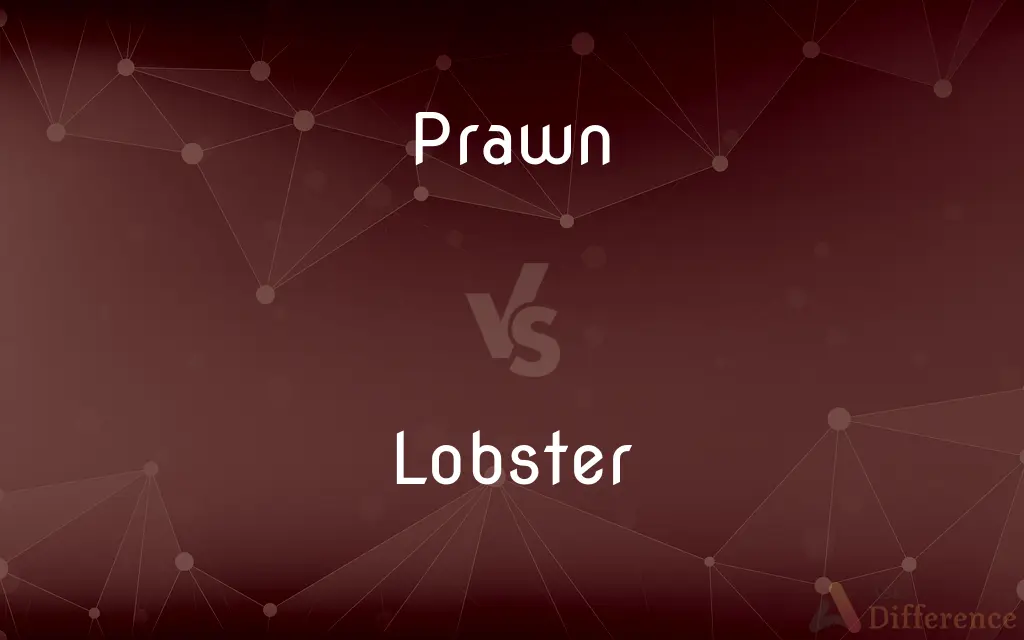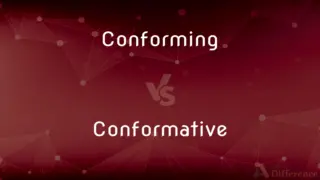Prawn vs. Lobster — What's the Difference?
Edited by Tayyaba Rehman — By Fiza Rafique — Updated on September 21, 2023
Prawn is a small-to-medium-sized crustacean similar to shrimp but generally larger. Lobster is a larger crustacean with a hard shell and distinctively large front claws.

Difference Between Prawn and Lobster
Table of Contents
ADVERTISEMENT
Key Differences
Prawn refers to a type of small-to-medium-sized crustacean that's similar to shrimp. They are usually found in both fresh and saltwater and are often used in culinary dishes. Prawns generally have a more uniform structure, with none of their legs being significantly larger than the others.
Lobster, on the other hand, is a type of marine crustacean usually found in saltwater. Lobsters are larger than prawns and have a hard shell. One of the most distinguishing features of a lobster is its large front claws, which are often much larger than the rest of its legs and are used for catching prey and defending themselves.
While both prawns and lobsters are popular in various cuisines, their flavors and textures are somewhat different. Prawns are generally considered to be sweeter and more delicate in flavor, whereas lobsters offer a denser, chewier meat.
Another difference is in the preparation and consumption of prawns and lobsters. Prawns are often peeled and deveined before cooking, while lobsters are frequently cooked whole, and the meat is then extracted from the shell. Overall, the two may seem similar but have distinct features, flavors, and uses in cooking.
Comparison Chart
Size
Small-to-medium
Larger
ADVERTISEMENT
Habitat
Freshwater and saltwater
Mostly saltwater
Physical Characteristics
Uniform legs
Large front claws
Flavor
Sweeter, delicate
Denser, chewier
Culinary Use
Often peeled and deveined
Often cooked whole
Compare with Definitions
Prawn
A small-to-medium-sized crustacean similar to shrimp.
The prawn cocktail was delicious.
Lobster
A larger marine crustacean with a hard shell.
The lobster bisque was rich and flavorful.
Prawn
An aquatic animal found in both fresh and saltwater.
Prawns thrive in diverse water conditions.
Lobster
Meat is denser and chewier compared to prawns.
The lobster tail had a satisfying texture.
Prawn
A seafood commonly used in various cuisines.
Prawns are a staple in many Asian dishes.
Lobster
Frequently cooked whole in culinary dishes.
We boiled the whole lobster for dinner.
Prawn
Characterized by a more uniform structure in legs.
Unlike lobsters, prawns have similar-sized legs.
Lobster
Usually found in saltwater habitats.
Lobsters are often caught in ocean traps.
Prawn
Often sweeter and more delicate in flavor.
The prawn curry had a subtle sweetness to it.
Lobster
Lobsters are a family (Nephropidae, sometimes also Homeridae) of large marine crustaceans. Lobsters have long bodies with muscular tails, and live in crevices or burrows on the sea floor.
Prawn
Prawn is a common name for small aquatic crustaceans with an exoskeleton and ten legs (which is a member of the order decapoda), some of which can be eaten.The term "prawn" is used particularly in the United Kingdom, Ireland, and Commonwealth nations, for large swimming crustaceans or shrimp, especially those with commercial significance in the fishing industry. Shrimp that are present in this category often belong to the suborder Dendrobranchiata.
Lobster
Any of several edible marine decapod crustaceans of the family Nephropidae, especially of the genus Homarus, having stalked eyes, long antennae, a pair of large pincers, and a cylindrical body.
Prawn
Any of various shrimps, especially one that is large or inhabits fresh water.
Lobster
Any of several similar crustaceans, such as a spiny lobster.
Prawn
The flesh of a prawn, used as food.
Lobster
The flesh of a lobster used as food.
Prawn
To fish for prawns.
Lobster
To catch or try to catch lobsters.
Prawn
A crustacean of the suborder Dendrobranchiata.
Lobster
Red-colored, especially from a sunburn.
Red as a lobster
Prawn
(Commonwealth) A crustacean, sometimes confused with shrimp.
Lobster
A crustacean of the Nephropidae family, dark green or blue-black in colour turning bright red when cooked, with a hard shell and claws, which is used as a seafood.
Prawn
Synonym of butterface: A woman with an attractive body but an unattractive face.
She's a prawn!
Lobster
A crustacean of the Palinuridae family, pinkish red in colour, with a hard, spiny shell but no claws, which is used as a seafood.
Prawn
A fool, an idiot.
Lobster
A soldier or officer of the imperial British Army (due to their red or scarlet uniform).
Prawn
Alternative form of porn.
Lobster
(slang) An Australian twenty dollar note, due to its reddish-orange colour.
Prawn
(intransitive) To fish for prawns.
Lobster
To fish for lobsters.
Prawn
Any one of numerous species of large shrimplike Crustacea having slender legs and long antennæ. They mostly belong to the genera Pandalus, Palæmon, Palæmonetes, and Peneus, and are much used as food. The common English prawn is Palæmon serratus.
Lobster
Any large macrurous crustacean used as food, esp. those of the genus Homarus; as the American lobster (Homarus Americanus), and the European lobster (Homarus vulgaris). The Norwegian lobster (Nephrops Norvegicus) is similar in form. All these have a pair of large unequal claws. The spiny lobsters of more southern waters, belonging to Palinurus, Panulirus, and allied genera, have no large claws. The fresh-water crayfishes are sometimes called lobsters.
Prawn
Any of various edible decapod crustaceans
Lobster
As a term of opprobrium or contempt: A gullible, awkward, bungling, or undesirable person.
Prawn
Shrimp-like decapod crustacean having two pairs of pincers; most are edible
Lobster
Flesh of a lobster
Prawn
Fish for prawns
Lobster
Any of several edible marine crustaceans of the families Homaridae and Nephropsidae and Palinuridae
Lobster
Known for their large, distinct front claws.
The lobster used its claws to catch prey.
Common Curiosities
Do lobsters live in freshwater?
No, lobsters are mostly found in saltwater habitats.
What is a prawn?
A prawn is a small-to-medium-sized crustacean similar to shrimp.
Can prawns be found in freshwater?
Yes, prawns can be found in both freshwater and saltwater.
What is a lobster?
A lobster is a larger marine crustacean known for its large front claws.
Are prawns and lobsters the same?
No, they are different in size, habitat, and physical characteristics.
What is the flavor profile of prawns?
Prawns are generally sweeter and more delicate in flavor.
How is lobster cooked?
Lobsters are often cooked whole.
What does lobster taste like?
Lobster meat is denser and has a chewier texture.
How are prawns prepared for cooking?
They are often peeled and deveined.
Are prawns and lobsters used in the same recipes?
While they can be substituted for each other, they are best suited for specific recipes due to flavor differences.
Can you eat prawn shells?
While some recipes use fried prawn shells, they are usually peeled.
Can you eat lobster shells?
No, lobster shells are hard and not edible.
Are lobsters expensive?
Yes, lobsters are often considered a luxury item.
Are prawns expensive?
They are generally less expensive than lobsters.
What are the health benefits of eating prawns and lobsters?
Both are rich in protein and low in fat, but they also contain cholesterol.
Share Your Discovery

Previous Comparison
Reseat vs. Resit
Next Comparison
Conforming vs. ConformativeAuthor Spotlight
Written by
Fiza RafiqueFiza Rafique is a skilled content writer at AskDifference.com, where she meticulously refines and enhances written pieces. Drawing from her vast editorial expertise, Fiza ensures clarity, accuracy, and precision in every article. Passionate about language, she continually seeks to elevate the quality of content for readers worldwide.
Edited by
Tayyaba RehmanTayyaba Rehman is a distinguished writer, currently serving as a primary contributor to askdifference.com. As a researcher in semantics and etymology, Tayyaba's passion for the complexity of languages and their distinctions has found a perfect home on the platform. Tayyaba delves into the intricacies of language, distinguishing between commonly confused words and phrases, thereby providing clarity for readers worldwide.














































